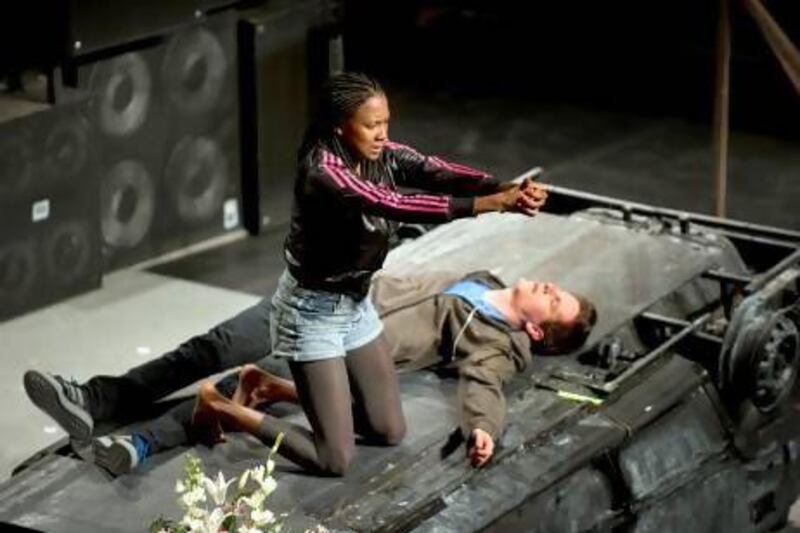Of all Shakespeare's plays, perhaps Romeo and Juliet best lends itself to modern adaptations. After all, the essence of the play is about eschewing conventions - youngsters in thrall to their passions rebelling against the customs of their parents and society.
With this in mind, there was hardly great astonishment to find that this version of William Shakespeare's tragedy had been shifted into the present day.
The show, brought to the UAE from London's Globe Theatre, finished its two-night run at the Abu Dhabi Theatre on Monday evening, as part of this year's Abu Dhabi Festival programme.
For this production, the director Bill Buckhurst opted to remove the action from its original Italian Renaissance setting and relocated it to a deprived British housing estate.
So, a burnt-out car took centre stage, the cast were costumed in tracksuits and baseball caps and when the Capulet and Montague feud descended into violence, instead of elegant sword duelling, the ensemble brawled it out with Stanley knives.
But while at times it all resembled an episode of the British, London-based working-class soap opera EastEnders, thankfully this did not distract from the full tragedy of the tale. Possibly there could have been a jarring disparity in having such earthy characters articulating Shakespeare's exquisite poetry. The fact this did not occur is largely down to the talents of the cast.
Of the leads, Jade Anouka performed admirably as Juliet, although perhaps playing the character with a more confident and streetwise attitude than one is used to seeing in previous incarnations of the lovestruck maiden.
Will Featherstone acted out Romeo as a petulant boy-band member, even occasionally bursting into singing the odd One Direction number. But while he adequately captured the hormonal rages and vacillating emotions of the part, his snivelling demeanour made it hard to feel affection for his predicament.
Other cast members worth a mention include Lisa Stevenson who, with her bawdy innuendos and Eliza Doolittle-esque cockney squawks, stood out as Juliet's doting nurse. Richard James-Neale was also outstanding as Mercutio, capturing the larger-than-life swagger and volatile temper of Romeo's close companion with aplomb.
As for the play itself, perhaps the standout scene was the ball where the star-crossed lovers first meet, envisaged by the director as a fancy-dress party. It's doubtful that Batman, Scooby-Doo, Elvis and Darth Vader have ever before danced together on stage in a production of Shakespeare.
This, as well as the director Buckhurst giving equal weight to the play's comedic nature as its tragedy, made for a highly entertaining evening.
The problem with it all, however, was that in many ways, this play is too famous for its own good. Such has been the profusion of adaptations of Romeo and Juliet that one cannot help but feel pity for anyone charged with bringing ingenuity to their version.
In this case, positioning the tale in the world of feral street punks has obviously been done before - just think West Side Story.
So, while this was a gallant, well-intentioned attempt to be fresh and inventive, perhaps it did lack a certain originality.
Follow us
[ @LifeNationalUAE ]





